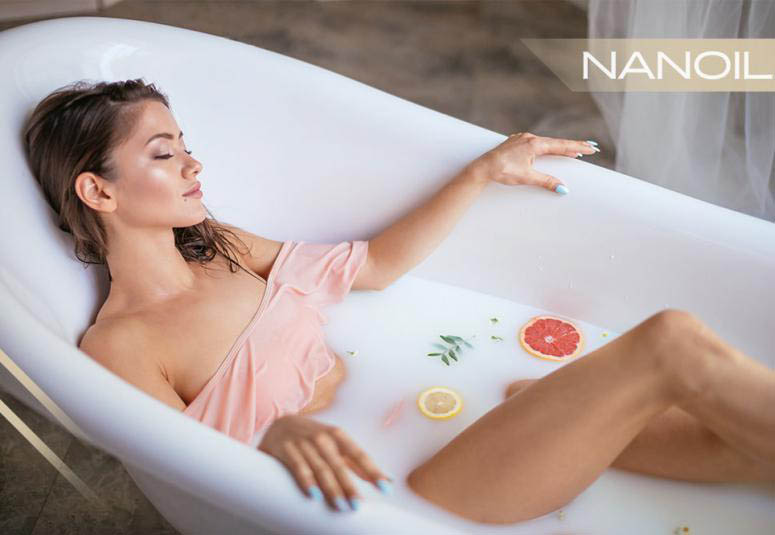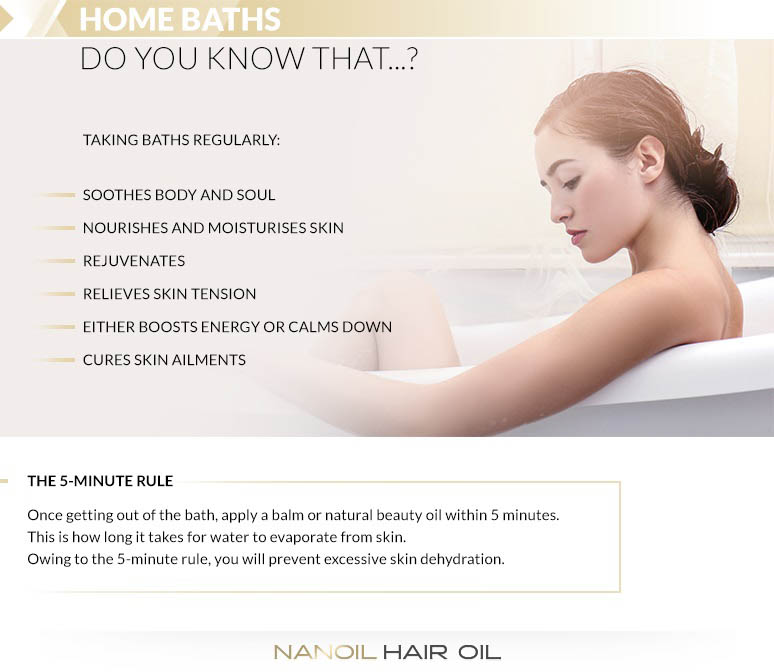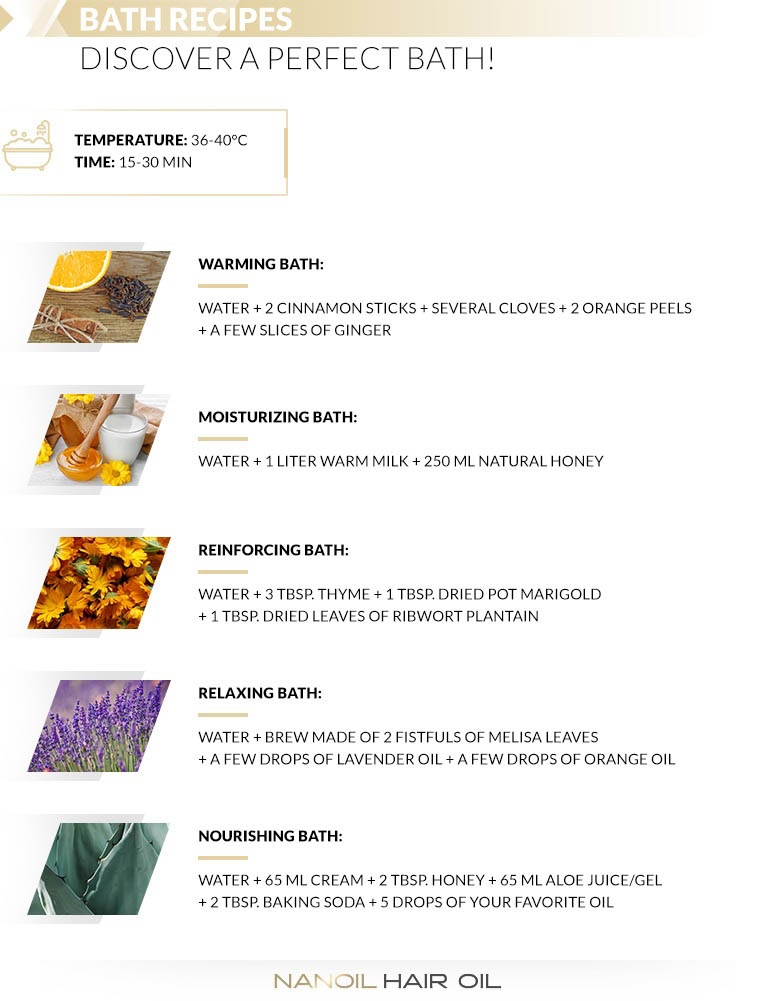- NANOIL Products
- Oils
- Face serums
- Hair masks
- Shampoos
- Hair conditioners
- Hair styling
- Care
- Hair Porosity Test
- Blog
- Contact

Although it might sound surprising, bathing is one of the finest methods of making your body skin supple and beautiful. Do you know how to take care of your body during and right after bathing? Are you familiar with the benefits of taking regular baths? Feel like Cleopatra and dip your body in a nourishing milk-and-honey bath or make use of other ideas for having the incredibly relaxing bath time.
Once a tough day is finally over, you definitely deserve a moment of relaxation and unwinding. And there's nothing else to make it possible but the bath - and it doesn't have to be one of those fancy SPA treatments but only a regular bath taken at home. The secret though is to choose the right bath additives (e.g. natural beauty oils). Only then does the bathtime bring the desired outcomes that take the form of soothed body and soul. After all, our body adores baths so why shouldn’t you take the most out of it!
An old Japanese saying goes: "Take a bath because it feels almost like heaven." Japanese people give baths a very metaphorical meaning. For example, on the New Year's Day they wash their bodies with cool water to increase their chance for achieving prosperity. In their culture water doesn't only symbolize body purification, but also a spiritual one.
In Azerbaijan there are other types of rituals connected with bathing. Azerbaijan people take baths in... crude oil which, in fact, is considered as a panacea for all skin problems. For the Hungarian baths taken in thermal pools are a way of a day-long relaxation, just like for the Danish who associate baths with hygge.
Still, the most serious approach towards baths is taken by Turkish people to whom Hammam cleansing tradition is a kind of a metaphysical experience - a bath taken in Turkish bath-house lasts a few hours and is divided into a few stages, each of them carries a particular meaning.
Even people living in antiquity recognized the power of baths. The best known body care ritual were the baths taken in donkey milk and honey. It’s believed that one of such milky bath supporters was Cleopatra who, in fact, took them regularly. This ritual was supposed to preserve her youth and beauty. What’s interesting, people who prepared baths for Cleopatra needed milk taken from 700 mares to fill up a bathtub! When it comes to European empresses, Catherine the Great is believed to take baths in egg yolk, almond oil, rose water and... vodka!
Today, since we have started recognizing the multi-purposes and potential of this treatment, more and more people report taking long baths instead of quick showers. If we only have the opportunity, we go for jumping into a bathtub to indulge ourselves in this leisure that is strictly connected with warm water and aromatic oils. However, is it a good thing to do?
Dipping body in a bath is, by large, a way to relax oneself and unwind after a long and exhausting day. This simple treatment can significantly reduce the risk of depression because it brings relief, help us to calm down and eliminates the aftermath of long exposure to stress.
Moreover, bathing shouldn't be associated with a sheer pleasure only since it's also a therapeutic procedure. Immersing the body in water that has particular temperature helps relieve muscle tension, deals with muscle cramps as well as reduces pain in joints and head, for example. Some people compare the effects brought about by taking relaxing baths with the outcomes achieved due to full body massage.
The advantages of bathing also include body detoxification and supplying it with essential nourishing substances. Additionally, this treatment boosts blood and lymph flow, which is entailed with fighting back cellulite and even making body slimmer.
If we want to stay away from a common cold, bathing will help you boost immune system. When it comes to sleeping disorders, a warm bath is said to combat insomnia by facilitating falling asleep.
Last but not least, one of the biggest advantages of bathing is the anti-aging effect that this treatment has. Antioxidants combined with unwinding in a bathtub are enough to delay aging processes, they make skin more elastic as well as reduce discolorations, wrinkles and other signs that passing time leaves on our bodies.

The good news is that you don't have to visit SPA in order to take the most out of what bathing might offer you. Such a relaxing, rejuvenating and energizing bath can be easily prepared at home.
It goes without saying that you need a bathtub, yet there is more items that are required for this beauty ritual. What else is worth preparing?
Without water you won't prepare bathing - there are no doubts about it, right? Basically, it'd be best is the water wasn't too hard because this might contribute to worsening body condition. You may try to filter the water but, luckily, this won't be necessary. The temperature is what matters most:
Indeed, the diversity of bath additives might surprise us. You can choose the products by matching them to your skin needs/type or focus on dealing with particular skin problems. However, it should be realized that no bubble bath, salts, milks, balls and other similar products come up to natural herbs and oils - the only ones deprived of preservatives and synthetic substances.
Undoubtedly, the easiest way is to pour bubble bath to water. However, sometimes it's not worth cutting a corner, and therefore preparing a bath with natural additives might turn out to be incredibly beneficial. Actually, this practice gives you more possibilities - the thing you add to the bath water influences the properties and effects of your home bathing. Obviously, you can combine and mix the ingredients so as to create a bath tailored to your needs.
What's worth adding to a bath to condition skin better?
The best among natural bath additives are oils that reinforce natural hydro-lipid barrier of skin, keep the adequate level of hydration, nourish, add softness, smoothness and elasticity. Obviously, each oil bath might display various properties, which is strictly connected with the oil we choose for this home beauty ritual:
If you wish to add some aromatherapeutic properties to your bath, then you should reach for essential oils. Not only are they able to put you in a good mood, relax or invigorate (depending on which one you choose) but also are antiseptic and have skin conditioning effects. Below the list of the most popular essential oils that you may use:
Throwing fresh and dried herbs (or alternatively herbal infusion) to warm water is a perfect method of enriching regular baths with extra properties. The way in which such bathing will affect our bodies depends on the herbs we choose:
Apart from oils and herbs you can also add other substance that positively affect skin. The good news is that we have many of them at hand but frequently we aren't even aware of the enormous benefits they offer:

If you don't know how to upgrade your regular bathing ritual to achieve particular effects, you can make use of the following bath recipes. Here are the best home baths that you can prepare all by yourself!
A bath isn't only the way of soothing body and soul but also it soothes skin. Is this treatment limited to these three aspects? By applying a few simple tricks you can transform a regular bath into home SPA and provide care to your entire body.
For a start, let's focus on hair care that can be delivered during a bath. All you have to do is - before getting into a bath filled with aromatic oils - apply either a hair mask or an oil. Humidity and higher temperature will make your hair oil treatment more effective and deliver the effects of hair steam treatment. While enjoying the benefits of a bath, the nourishing substances are penetrating the hair to regenerate and condition it from the inside.
In a similar way we can take care of our face skin. Just apply a face mask (either bought in a drugstore or homemade) and indulge yourself in the moment of relaxation while the nourishing substances of the mask are taking care of your complexion. Naturally, face masks applied should answer your current skin needs.
Comments: #0